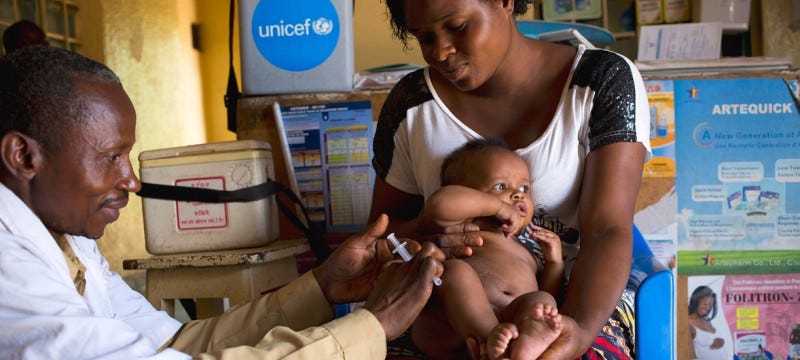Coronavirus – Democratic Republic of the Congo: Coronavirus poses latest threat to battered health system in DR Congo
Strengthening the battered healthcare system in the DRC is vital to protect young lives

The looming threat of the new coronavirus disease COVID-19 is just the latest challenge to the beleaguered health care system in the Democratic Republic of the Congo (DRC), which is struggling with deadly measles and cholera epidemics that have killed thousands of children over the past year, the UN children’s fund (UNICEF) said on Tuesday.
As the DRC has also been battling an Ebola outbreak in the volatile eastern region, UNICEF fears mounting cases of COVID-19 will further strain the public health system in a country that is among the most at risk in Africa.
“Coronavirus will most likely divert the available national health capacity and resources, and leave millions of children affected by measles, malaria, polio and many other killer diseases,” said UNICEF Representative Edouard Beigbeder, speaking from the capital, Kinshasa.
While the DRC has so far recorded nearly 100 cases of COVID-19 and eight deaths, the measles epidemic has generated 332,000 cases and killed over 5,300 children since early 2019, making it the worst in the world. At the same time, 31,000 cases of cholera were reported during this period.
And although the Ebola outbreak garnered international attention and has been contained, UNICEF said it had “unfortunate side-effects” as resources to fight childhood killers like measles, cholera and malaria, instead went towards stemming the disease.
Health system ‘on life support’
Strengthening the battered healthcare system in the DRC is vital to protect young lives, a new UNICEF report titled On Life Support argues.
Medical services there are ill-equipped and underfunded, trained staff are in short supply, and around half of all facilities lack safe water and sanitation.
UNICEF estimates more than nine million children across the country require humanitarian assistance, including health care.
Most live in the three eastern provinces affected by the Ebola outbreak, where many doctors and nurses chose to take better-paying jobs in Ebola response.
Ongoing militia violence in these areas – including attacks against health centres –forced nearly one million people to flee their homes in 2019, thus making it harder for families to access health facilities.
“Unless health facilities have the means to deliver immunization, nutrition and other essential services, including in remote areas of the country, we risk seeing the lives and futures of many Congolese children scarred or destroyed by preventable diseases”, Mr Beigbeder warned.
Increase support for public health
UNICEF is calling on the Congolese Government to allocate more public funding for basic health care services that support pregnant women, newborns and young children, and to prioritise the strengthening of routine immunization.
Currently, less than six per cent of the annual budget goes towards healthcare, which must change, according to Xavier Crespin, the agency’s Chief of Health in the country.
“Instead of expending huge efforts and resources on an ad hoc response to individual health emergencies, those same resources should be directed towards strengthening the national health system,” he said.
“That means a big investment in routine immunization, in adequate staffing and salaries, and in equipment that is currently in extremely short supply, especially outside urban areas.”
UNICEF is also urging donors to support national efforts to improve routine health care services in order to better protect children against communicable diseases.



